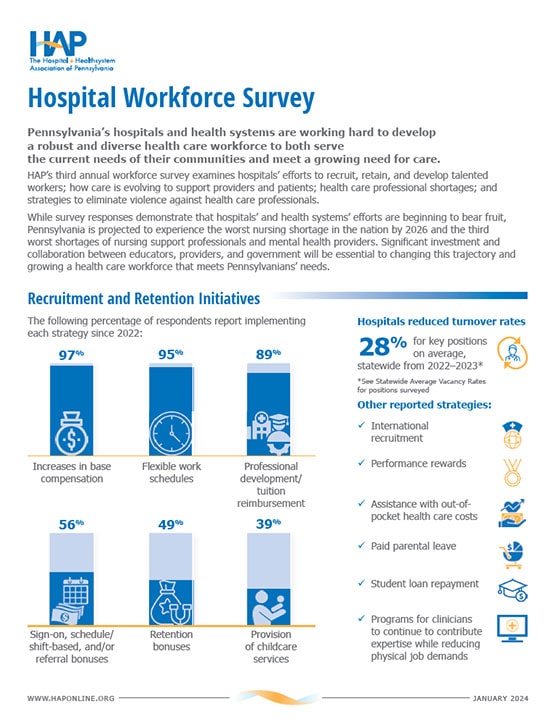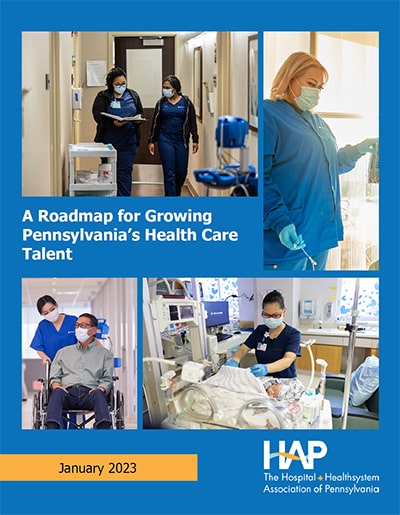The Health Care Workforce is in Crisis
Health care workforce shortages across Pennsylvania and the nation were approaching a crisis even before the COVID-19 pandemic. An aging population means more health care professionals are retiring just as demand for care is increasing. There is not enough infrastructure in place to educate and train the next generation of health care workers who will be needed to care for Pennsylvanians.
Hospitals and health systems are working hard to grow their workforce today and for the future. While they are making progress reducing staff turnover and vacancies, comprehensive investments and public policies are needed to help them strengthen Pennsylvania’s health care workforce.
Hospitals are Leading with Solutions
HAP’s November 2023 survey of Pennsylvania hospitals highlights the ways hospitals and health systems are aggressively working to develop, recruit, and retain health care professionals. HAP’s survey found:
- Hospitals are taking extraordinary efforts to recruit and retain clinicians. Nearly all are increasing base pay (97%), offer flexible work schedules (95%), and provide professional development and/or tuition reimbursement (89%). Roughly half offered sign-on, schedule-based, and/or referral bonuses (56%) and retention bonuses (49%), and 39 percent provided child care, compared to fewer than 6 percent of all employers nationwide.
- Hospitals are working with educators and their communities to grow the health care workforce. Nearly all are partnering with community colleges and four-year colleges/universities (99%) and high schools (92%). More than half are also partnering with trade/technical schools and/or community organizations (55%) and many are reaching all the way to the middle school level (25%).
- Hospitals are transforming how care is delivered to better meet the needs of patients, reduce strain on staff, and empower professionals to practice at the top of their licenses. This includes adopting innovative models such as team-based care, virtual nursing, telemedicine, hospital-at-home programs.
As a result of these efforts, hospitals reduced turnover for direct care professionals by 28 percent on average, statewide from 2022–2023.

HAP Report: Hospital Workforce Survey, January 2024
Download report
Pennsylvania’s Workforce Shortages are Among the Most Severe
There is a national health care workforce shortage but the challenges in Pennsylvania are among the most severe.
A 2021 report ranked Pennsylvania’s shortage of nurses the worst in the nation and the commonwealth’s shortages of nursing support staff and mental health professionals third most severe. Among the commonwealth’s 67 counties, 63 are entirely or partially primary care health professional shortage areas (HPSAs) and 53 are entirely or partially mental health HPSAs.

Despite improvement over 2022, hospitals continue to experience statewide average vacancy rates of 19 percent for nursing support staff, 14 percent for registered nurses, and more than 10 percent for most direct care positions. Hospitals in rural communities face even greater challenges with average vacancy rates of 28 percent for nursing support staff and 26 percent for registered nurses.
Public Policies Can Help Grow the Workforce
HAP supports public policies that help to grow the commonwealth’s health care workforce. HAP is currently advocating for:
- Growing the number of nurse educators and training sites by allowing flexibility in educator credentialing requirements, offsetting the earnings disparity between nurses who practice and nurse educators, and investing in nurse preceptors and clinical space.
- Keeping providers in Pennsylvania by expanding student loan repayment for front-line nurses and primary care providers.
- Bringing to scale proven programs that grow the health care workforce via partnerships between health care, education, community organizations, and the commonwealth.
- Recruiting international professionals by increasing administrative staffing for, awareness of, and the number of J1 visas.
During 2023, HAP—led by its Health Care Talent Task Force—developed comprehensive policy recommendations to serve as a roadmap for growing and supporting Pennsylvania’s health care talent. This roadmap builds on the task force’s initial recommendations issued during January 2020.

A Roadmap for Growing Pennsylvania's Health Care Talent
View report | Download report
Hospitals Support Safe Workplaces
Rising violence and abuse are adding to the strain on health care workers. Violence and abuse against health care professionals is never acceptable.
Hospitals are investing in workplace safety to protect employees amid rising violence against health care workers. HAP’s survey found that, during 2023, nearly all hospitals provided staff education on safety protocols (97%), implemented enhanced security measures (95%), provided de-escalation training (95%), and promoted respectful behavior (93%).
HAP supported state reforms enacted during 2020 that made it a felony to assault a health care worker and protected health care workers’ identities by allowing their last names to be omitted from ID badges. At the federal level, HAP supports the SAVE Act, introduced by U.S. Representative Madeleine Dean (D-4), which would make assaulting a health care worker a federal crime and provide grants to help hospitals improve safety.